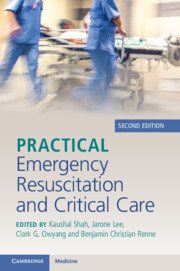Book contents
- Practical Emergency Resuscitation and Critical Care
- Practical Emergency Resuscitation and Critical Care
- Copyright page
- Contents
- Contributors
- Preface
- Section 1 General Critical Care
- Section 2 Infectious Disease Emergencies
- Section 3 Neurological Emergencies
- Section 4 Cardiovascular Emergencies
- 16 Post-Cardiac Arrest Care
- 17 Acute Coronary Syndrome
- 18 Acute Decompensated Heart Failure
- 19 Aortic Dissection
- 20 Hypertensive Emergencies
- 21 Valvular Diseases
- Section 5 Respiratory Emergencies
- Section 6 Gastrointestinal Emergencies
- Section 7 Renal Emergencies
- Section 8 Hematology–Oncology Emergencies
- Section 9 Endocrine Emergencies
- Section 10 Environmental Emergencies
- Section 11 Trauma
- Section 12 End of Life
- Index
- References
17 - Acute Coronary Syndrome
from Section 4 - Cardiovascular Emergencies
Published online by Cambridge University Press: 02 November 2023
- Practical Emergency Resuscitation and Critical Care
- Practical Emergency Resuscitation and Critical Care
- Copyright page
- Contents
- Contributors
- Preface
- Section 1 General Critical Care
- Section 2 Infectious Disease Emergencies
- Section 3 Neurological Emergencies
- Section 4 Cardiovascular Emergencies
- 16 Post-Cardiac Arrest Care
- 17 Acute Coronary Syndrome
- 18 Acute Decompensated Heart Failure
- 19 Aortic Dissection
- 20 Hypertensive Emergencies
- 21 Valvular Diseases
- Section 5 Respiratory Emergencies
- Section 6 Gastrointestinal Emergencies
- Section 7 Renal Emergencies
- Section 8 Hematology–Oncology Emergencies
- Section 9 Endocrine Emergencies
- Section 10 Environmental Emergencies
- Section 11 Trauma
- Section 12 End of Life
- Index
- References
Summary
Ischemic heart disease is the leading noninfectious cause of death in adults in the United States.
Acute coronary syndrome (ACS) refers to symptoms attributable to atherosclerotic disease of the epicardial coronary arteries, usually caused by a fixed atherosclerotic lesion of varying severity.
ACS is a spectrum of disease and can present as acute myocardial infarction (AMI) or unstable angina (UA). AMI is myocardial ischemia with necrosis and can occur with or without ST segment elevation. The latter is referred to as non-ST-segment elevation myocardial infarction (NSTEMI). UA is reversible myocardial ischemia without necrosis.
- Type
- Chapter
- Information
- Practical Emergency Resuscitation and Critical Care , pp. 149 - 158Publisher: Cambridge University PressPrint publication year: 2023

